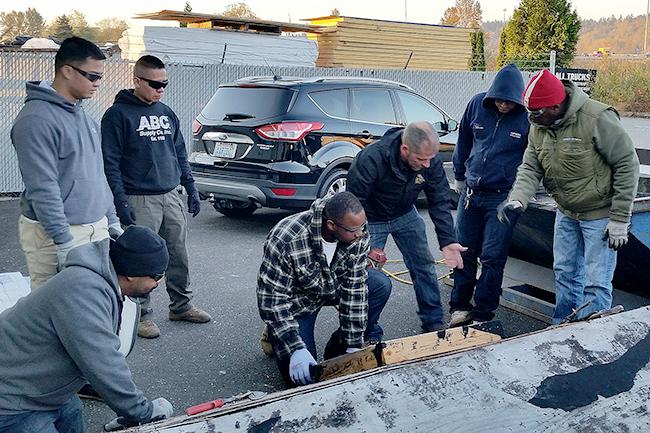Article by Ms. Kirstin Grace-Simons (Madigan Army Medical Center) January 4, 2018
Guardian Roofing is a proud supporter of the GAF Roofing Academy at JBLM.

(Photo courtesy of Ken Garcy/GAF Roofing Academy) Soldiers in the Career Skills Program roofing course on Joint Base Lewis-McChord, Wash. get hands-on training from local industry professional Richard Lamont, Roofing Specialist at Guardian Roofing.
GAF has partnered with ProTrain and US Military Pipeline to build a roofing installation training program to help veterans transition to the roofing industry.
Injury and illness can derail plans in an instant. They can upend a career and unsettle a family. Soldiers in the Warrior Transition Battalion (WTB) live through the many, potentially long-term, adjustments needed to make the most of their new reality.
“When I meet with them,” said Mary Ball, transition coordinator with the WTB, “one of the questions I ask in my initial in-processing interview with them is- what is your overall goal? Most of the time, it’s ‘I just need to provide for my family.’ That’s a huge stressor and they don’t know where to start.”
“All soldiers transitioning out of the military are asked to do the Soldier for Life – Transition Assistance Program,” said WTB Commander Lt. Col. Julie Craig. Unlike others transitioning, though, WTB Soldiers do not have to balance their regular assigned duties with transition. “Their job is to heal from whatever is going on with them,” Craig continued. Once their treatment has evened out they can, “Shift to thinking about leaving the Army and focusing on the Career and Education Readiness (program) activity.”
Among the 14 courses to the Career Skills Program on Joint Base Lewis-McChord is the only roofing one in the Department of Defense. One of the shorter courses, it consists of three weeks of hands-on training taught by local industry professionals followed by a week of interviewing and networking with potential employers. Upon completion, graduates go into the civilian world equipped with all the certifications, tools, and clothing needed, ready to work on day one.
Spc. Michael Jones knew he wanted to work outdoors, with his hands. He attended the career skills program brief that provided an overview of all of the courses offered. “I was already going to go into the construction industry when I got out,” Jones said. “I went to the one I liked best.” Interested specifically in roofing for commercial properties, Jones appreciated many aspects of the course and its instructor.
Ken Garcy, instructor with GAF Roofing Academy which functions in the Career Skills Program through a DoD memorandum of understanding with Army Installation Management Command, appreciates his wounded warrior trainees in return. He lived through much the same situation they have. “But, the WTB wasn’t around then,” he said. “There wasn’t the awareness and investment in transition as there is now.”
Garcy understands the processes involved in dealing with whatever the new reality may be and he shares strategies he’s found like goal planning and organizing materials needed for the next class or work day the night before.
The course was hard work and intense with 10-hour days and a great deal of information packed into its month timeframe. But, the Soldiers found it rewarding.
Spc. Jon Paul Bonilla said, “This program is helping me smoothly transition out of the Army. Directions have changed and now I’ve got to work with what I’ve got. For me, it definitely made it a lot easier and smoother – talking to people who’ve done, and had experience in, what I want to get into. It made it a lot easier because they’re giving me guidance and steps on what to do, who to talk to, where to go and that definitely made it a lot easier for me.”
It is not just this connection leading them to success, though. Unique to the WTB, the transition coordinator is the Soldier’s champion and conduit for information and resources.
Ball, one of the battalion’s three transition coordinators, explained that it is their job “to help funnel them to the right resource.” Working with the Soldier to coordinate medical treatment needs with Career and Education Readiness program activities, often to include the Career Skills Program, the coordinator makes use of the array of good working relationships they have established to smooth the path.
“We don’t just hand them a sheet of paper and say, well you can try these folks. No, we’re going to close that gap. And then we follow up,” said Ball. The transition coordinators work in partnership with all the players in the transition process to knit together the variety of opportunities and responsibilities facing the outbound Soldier. They are all, “Looking for reasons to help someone be successful,” said Ball.
Successful it is too. Jones and Bonilla, for example, finished the course just before Thanksgiving, both had job offers by the end of November and Jones was hired by mid-December.

